Are you or your family required to wear masks for protection against COVID-19? Are you wondering what masks are best for facing current concerns?
So many mask types are available in today’s market. You can choose cloth masks with cute designs, respirators, paint masks, or dust masks.
What type of protection does each mask provide, and how can you know that it’s keeping you and those around you safe?
We rank the best masks in terms of protection ability with one being the best.
1. N95 Surgical Masks
These are a combination of a surgical mask and a N95 respirator. They provide both:
- the splash resistance of a surgical mask >99% BFE (Bacterial Filtration Efficiency), as well as
- the secure facial seal of a particulate respirator with ≥95 % filtration of particles greater than 0.3 microns.
Surgical N95 masks like the 3M 1860 mask are recommended for healthcare workers who need protection from airborne hazards as well as high-velocity splashes and sprays.
They provide the best disposable mask protection from germs and are often used only in healthcare settings.
The edges of these respirators create a very snug fit, sealing up space around your nose and mouth. Surgical N95 masks get tested for their resistance to fluids, as well as their ability to filter particles and bacteria.
Please note: These are extremely difficult to come by and should not be purchased by anyone outside covid health care settings.
2. Particulate Respirators
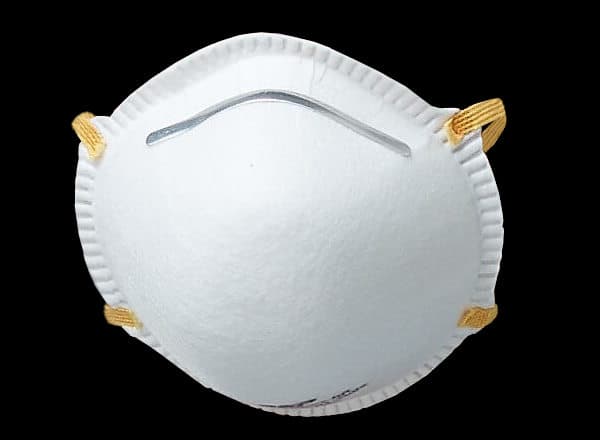
Particulate respirators filter particles out of the air as you breathe. They protect against mechanically generated particles such as dust, silica, asbestos and are also used against bacteria and some viruses.
There are three levels of particulate respirators which are tested against their ability to filter out non oil based particles; P1, P2 and P3.
- P3 provides ≥99.95% filtration of particles >0.3 micron.
- P2 provides ≥94% filtration of particles >0.3 micron, and
- P1 provides ≥80% filtration of particles >1 micron
A P3 classification can only be achieved when worn with a full face piece which is why is not a very common mask outside industrial settings. It just looks a little bit too apocalyptic. P1 and P2 masks on the other hand, are simple disposable masks.
The most common respirator is the P2 respirator which provides ≥94 % filtration of non-oil based particles greater than .3 microns. Around the globe the equivalent to P2 Masks are:
- FFP2 in Europe
- N95 in America
- KN95 in China
P2 masks and their equivalents are the best masks for airborne hazards in most situations and are currently being used extensively around the globe for the corona virus. This is because respirators provide protection from microscopic particles floating around in the air (airborne transmission), as well as direct sprays from talking and coughing (droplet transmission).
Some N95 masks come with a one way exhalation valve. This reduces the mask’s resistance to exhalation and so that it’s easier for the wearer to breathe. While this increases comfort for tradesmen where it doesn’t matter that the air being breathed out is not filtered, a P2 mask with an exhalation valve is not generally suitable for medical scenarios. Mark spokesperson for Canberra Diamond Blade Suppliers says “the P2 or N95 Masks with an exhalation valve are best suited to construction projects. This is because in this scenario, it is only important that the air breathed in is filtered. Masks that have an exhalation valve do not filter the air breathed out, therefore making them not suitable for many medical situations”
Did you know that we have FFP2, N95 and KN95 masks in stock and available through our online store.

3. Surgical Masks
Surgical masks are a loose-fitting, disposable mask that can protect your mouth from coming in contact with droplets that could contain viruses and bacteria.
A surgical mask does not provide the airborne transmission protection that particulate respirator does, as air can come in through the sides around the filter. They are designed to provide protection against front on sprays from talking or coughing (droplet protection).
They will also protect others by reducing their exposure to your saliva and other respiratory secretions.
Surgical masks are fluid-resistant, and graded as level 1, 2 or 3 based on the level of protection provided, or fluid resistance.
Level 3: maximum barrier protection: for heavy levels of aerosols, spray and/or fluids.
Level 2: moderate barrier protection: for low to moderate levels of aerosols, spray and/or fluids.
Level 1: low barrier protection: general use for short procedures and exams that don’t involve aerosols, spray or fluids.
| TEST | LEVEL 1 | LEVEL 2 | LEVEL 3 |
| ASTM F1862(Fluid Resistance) | 80 mmHg | 120 mmHg | 160 mmHg |
| MIL-M-36954 C: ΔP (Breathability) | < 4 mm H2O | < 5 mm H2O | < 5 mm H2O |
| ASTM F2101: BFE (Filtration 3μm) | ≥ 95% | ≥ 98% | ≥ 98% |
| ASTM F2299: PFE (Filtration 1μm) | ≥ 95% @ 0.1 micron | ≥ 98% @ 0.1 micron | ≥ 98% @ 0.1 micron |
Surgical mask coverage provides some convenience in that they can get disposed of right after you wear them, so you won’t need to worry about washing it before re-wearing. They are acceptable protection in most public settings.
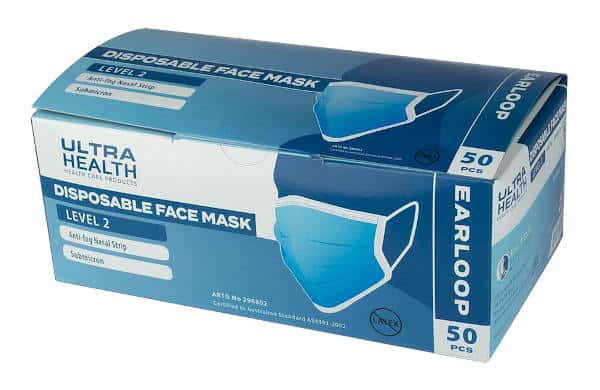
4. Cloth Masks with Filter
Cloth masks with filters are a great option for the public. As the thread of cloth is generally more porous than some of the disposable options, the filter can help catch some of the aerosol-sized particles that experts are concerned about with the COVID-19 virus, and you can wash and reuse the main mask.
For lower-risk scenarios like shopping and getting petrol, a cloth mask usually provides adequate protection.
The effectiveness of your filter will depend upon the type of material you put into the filter pocket. Generally, however, masks with a filter, even just a paper towel, are more protective than those without them.
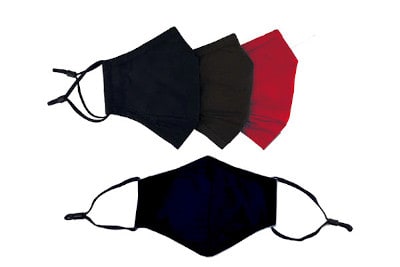
We have cloth masks in stock that come with disposable PM2.5 filters that provide ≥94% filtration of particles >0.3 micron. These give you the benefit of the convenience of a cloth mask, but the added protection should you require it.
While cloth masks don’t provide a secure seal like the particulate respirators, they are a great option for low-risk scenarios.
5. Nuisance Dust Mask / Utility Masks
A nuisance dust mask provides basic protection against pollen, dust, and dander and like a cloth mask give you basic protection when shopping. You wouldn’t use a nuisance mask in a health care setting.
“A simple, flexible barrier that is placed over the nose and mouth during short exams and visitations, or during short procedures that do not produce fluid, spray, or aerosols. Utility masks are not regulated as medical devices and are not recommended to provide protection from COVID-19.” TGA Australia
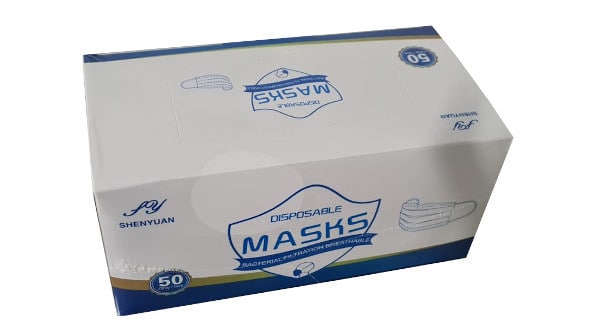
A nuisance dust mask won’t protect you against hazardous fumes, asbestos, or aerosols. Nuisance dusk masks also can’t be worn to protect those who have asthma from reactions to dust, mold spores, or dyes.
These can look similar to surgical masks, but they have not been tested against the stringent regulations that are in place for medical masks.
6. Cloth Masks
A cloth mask can catch particles when someone talks, coughs, or sneezes. If someone is unaware that they have coronavirus, a cloth mask can help them avoid spreading it.
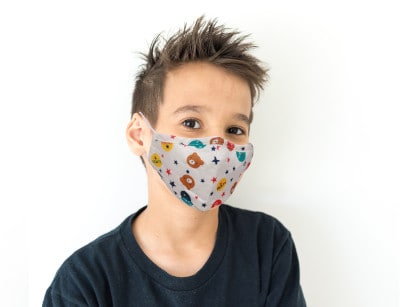
Cloth masks are currently available in a wide variety of patterns and styles. Many people turn their cloth masks into fashion statements, with glitter, writing, or color.
These types of face masks are not intended for use in a clinical setting or explicitly to prevent the transmission of disease between persons and therefore are not subject to the same regulations as surgical masks or some respirators.
Most cloth masks are more expensive than disposable styles, so they are made to be re-used. It’s quite unsanitary to re-use masks that you’ve worn before, so you’ll need to wash and dry your masks properly in between uses.
But not all cloth masks are created equal and it is hard to know what you are getting. Multi-layer cloth masks are better than single layers, and the tighter the thread count, the better the mask. We have great 3 layer cotton masks for sale. And as mentioned above, they come with a pocket for a filter which you can use our PM2.5 filters, or paper towel, or use it without.
Choosing the Right Face Mask
The government in Australia is now recommending and sometimes requiring masks in situations where social distancing isn’t possible.
In public settings, for example, it can be difficult to distance. This is especially true if you’re paying for something at a cashier or taking public transport.
The right type of face mask for your situation will depend a lot on where you’ll be spending your time. Those in the medical profession, for example, may be required to wear a disposable respirator or surgical mask to keep from getting and spreading infection. They may also get asked to couple their mask with a face shield, which can provide extra protection.
If you are in a vulnerable cohort of people, then you also might want to wear a particulate respirator.
If you don’t go out much and aren’t given to washing your face masks, surgical masks and public protection masks can provide you with the right amount of protection. They will prevent the spread of germs in public, and you can dispose of them after use.
For the average person who isn’t working in a healthcare setting, cloth masks provide reasonable protection against the spread of coronavirus. They can be used repeatedly, and you won’t be at risk of purchasing ineffective masks for your needs.
Cloth masks can save you money and the environment as you can re-use them often.
If you wear glasses our KN95 masks are ranked the best for glasses as you can use the straps to hold the glasses on your face. And due to their secure facial seal, when fitted properly, they prevent your glasses from fogging up.
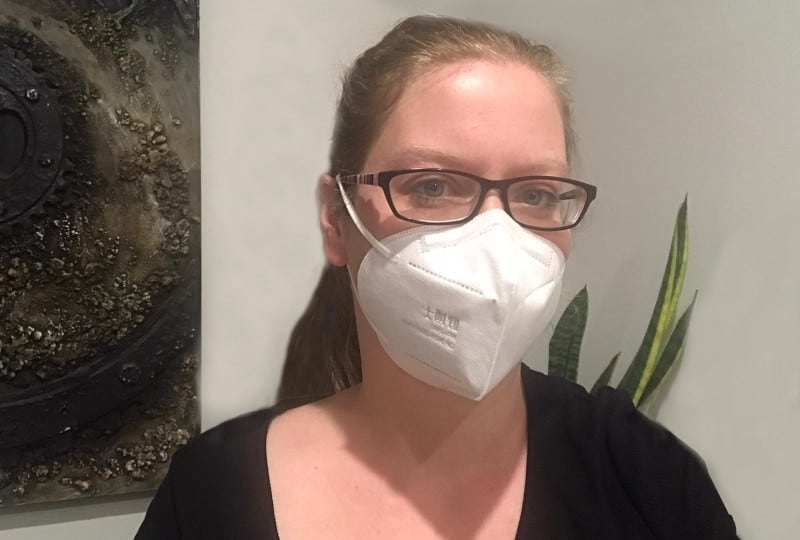
The best protection against the spread of COVID-19 is social distancing. As much as possible, stay at least six feet away from those around you.
If you feel sick at all, stay at home until you feel better. Be sure to check your temperature or get tested if you’re at all worried that you have the virus.
When social distancing isn’t possible, however, the right mask can help you and those around you to stay safe and healthy.
If you are wondering where to buy face masks, we have a large range in stock for all different applications. Check out face
What Masks Are Best for Virus Protection?
With so many options available, it can be difficult to know what masks are best in the prevention of the spread of COVID-19. With a little research, however, you can find the best mask suited to your situation. Just don’t forget that we have masks for sale Australia wide. It will keep you healthy and safe during an uncertain time.
Wondering where to buy kids masks, read more about our range here.
Delivery to Melbourne, Sydney, Canberra, Adelaide, Perth, Brisbane
We have stock in store in Canberra and deliver masks Australia wide through our online mask shop. So whether you are in Melbourne, Sydney, or Brisbane, over on the west coast in Perth, or well anywhere in Australia… we deliver the best masks Australia wide.

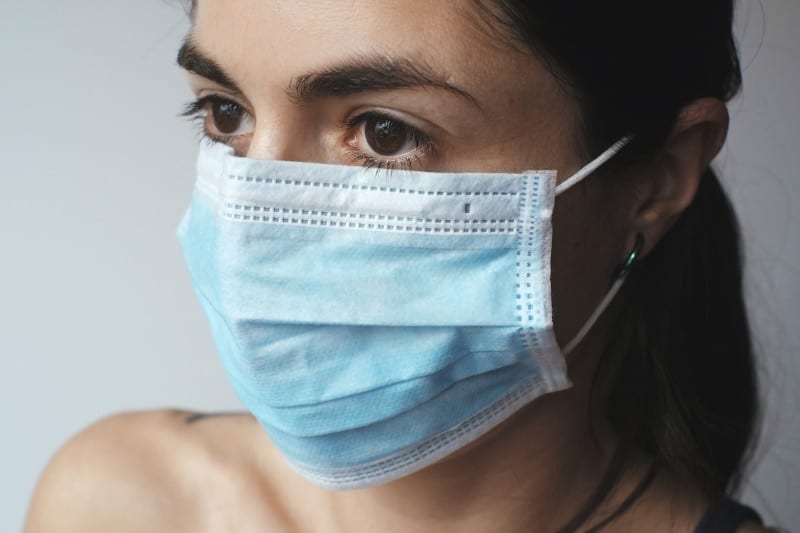

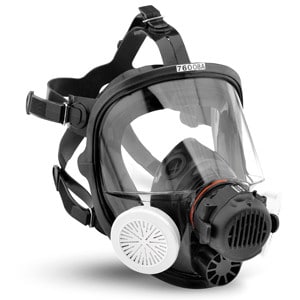
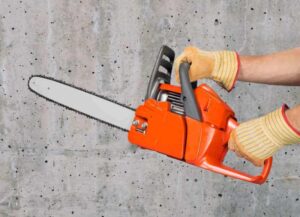
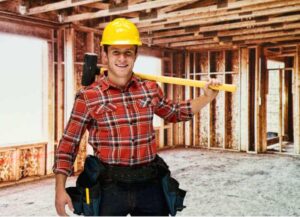
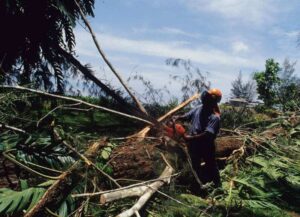
I am really impressed with your writing skills and also with the layout on your blog. Is this a paid theme or did you modify it yourself? Anyway keep up the nice quality writing, it is rare to see a nice blog like this one today.| Margaretha